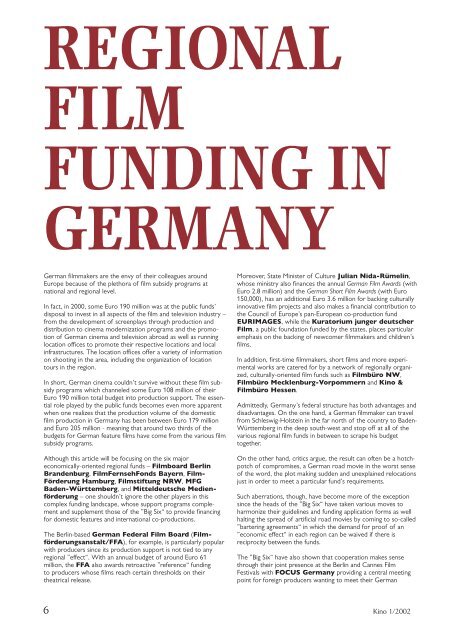Titel Kino 1/2002 - German Cinema
Titel Kino 1/2002 - German Cinema
Titel Kino 1/2002 - German Cinema
Create successful ePaper yourself
Turn your PDF publications into a flip-book with our unique Google optimized e-Paper software.
REGIONAL<br />
FILM<br />
FUNDING IN<br />
GERMANY<br />
<strong>German</strong> filmmakers are the envy of their colleagues around<br />
Europe because of the plethora of film subsidy programs at<br />
national and regional level.<br />
In fact, in 2000, some Euro 190 million was at the public funds’<br />
disposal to invest in all aspects of the film and television industry –<br />
from the development of screenplays through production and<br />
distribution to cinema modernization programs and the promotion<br />
of <strong>German</strong> cinema and television abroad as well as running<br />
location offices to promote their respective locations and local<br />
infrastructures. The location offices offer a variety of information<br />
on shooting in the area, including the organization of location<br />
tours in the region.<br />
In short, <strong>German</strong> cinema couldn’t survive without these film subsidy<br />
programs which channeled some Euro 108 million of their<br />
Euro 190 million total budget into production support. The essential<br />
role played by the public funds becomes even more apparent<br />
when one realizes that the production volume of the domestic<br />
film production in <strong>German</strong>y has been between Euro 179 million<br />
and Euro 205 million - meaning that around two thirds of the<br />
budgets for <strong>German</strong> feature films have come from the various film<br />
subsidy programs.<br />
Although this article will be focusing on the six major<br />
economically-oriented regional funds – Filmboard Berlin<br />
Brandenburg, FilmFernsehFonds Bayern, Film-<br />
Förderung Hamburg, Filmstiftung NRW, MFG<br />
Baden-Württemberg, and Mitteldeutsche Medienförderung<br />
– one shouldn’t ignore the other players in this<br />
complex funding landscape, whose support programs complement<br />
and supplement those of the ”Big Six“ to provide financing<br />
for domestic features and international co-productions.<br />
The Berlin-based <strong>German</strong> Federal Film Board (Filmförderungsanstalt/FFA),<br />
for example, is particularly popular<br />
with producers since its production support is not tied to any<br />
regional ”effect“. With an annual budget of around Euro 61<br />
million, the FFA also awards retroactive ”reference“ funding<br />
to producers whose films reach certain thresholds on their<br />
theatrical release.<br />
Moreover, State Minister of Culture Julian Nida-Rümelin,<br />
whose ministry also finances the annual <strong>German</strong> Film Awards (with<br />
Euro 2.8 million) and the <strong>German</strong> Short Film Awards (with Euro<br />
150,000), has an additional Euro 3.6 million for backing culturally<br />
innovative film projects and also makes a financial contribution to<br />
the Council of Europe’s pan-European co-production fund<br />
EURIMAGES, while the Kuratorium junger deutscher<br />
Film, a public foundation funded by the states, places particular<br />
emphasis on the backing of newcomer filmmakers and children’s<br />
films.<br />
In addition, first-time filmmakers, short films and more experimental<br />
works are catered for by a network of regionally organized,<br />
culturally-oriented film funds such as Filmbüro NW,<br />
Filmbüro Mecklenburg-Vorpommern and <strong>Kino</strong> &<br />
Filmbüro Hessen.<br />
Admittedly, <strong>German</strong>y’s federal structure has both advantages and<br />
disadvantages. On the one hand, a <strong>German</strong> filmmaker can travel<br />
from Schleswig-Holstein in the far north of the country to Baden-<br />
Württemberg in the deep south-west and stop off at all of the<br />
various regional film funds in between to scrape his budget<br />
together.<br />
On the other hand, critics argue, the result can often be a hotchpotch<br />
of compromises, a <strong>German</strong> road movie in the worst sense<br />
of the word, the plot making sudden and unexplained relocations<br />
just in order to meet a particular fund’s requirements.<br />
Such aberrations, though, have become more of the exception<br />
since the heads of the ”Big Six“ have taken various moves to<br />
harmonize their guidelines and funding application forms as well<br />
halting the spread of artificial road movies by coming to so-called<br />
”bartering agreements“ in which the demand for proof of an<br />
”economic effect“ in each region can be waived if there is<br />
reciprocity between the funds.<br />
The ”Big Six“ have also shown that cooperation makes sense<br />
through their joint presence at the Berlin and Cannes Film<br />
Festivals with FOCUS <strong>German</strong>y providing a central meeting<br />
point for foreign producers wanting to meet their <strong>German</strong><br />
6 <strong>Kino</strong> 1/<strong>2002</strong>
















